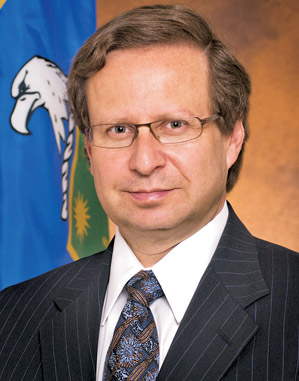A missing variable in the clean energy equation
DOI: 10.1063/PT.3.1393
Steven Koonin, a former chief scientist at BP, was confirmed by the Senate in May 2009 as undersecretary for science at the Department of Energy. He resigned from DOE on 18 November to accept what he says is a temporary position at the Institute for Defense Analyses, a think tank in Alexandria, Virginia. PHYSICS TODAY spoke to Koonin on 22 November. Following are excerpts from the interview. The full Q&A is available in the Politics and Policy section of http://www.physicstoday.org
PT: Did you find your experience at BP useful in your role as undersecretary?
KOONIN: Absolutely. Energy needs to happen through the private sector. It owns, builds, operates essentially all the energy infrastructure in the country, and I don’t think we have any intention of changing that. So if you’re going to be effective in technology development and regulation, you really have to understand the private sector and how it thinks. That doesn’t mean that you fold to it; there has to be a healthy tension between the government and the private sector. I could wish for more people in the government who had that experience. In fact, I would say more generally that many of the people reading PHYSICS TODAY are in the academic world. If they want to really change energy, I would strongly recommend six months or a year out in the private sector, whether in a big company or a small startup. It really is a very different mindset than what a basic researcher has.
PT: That would be enough time to accomplish something? A sabbatical?
KOONIN: Look, you’d like more, but you will have the realities of the academic cycle. Go sit inside a big energy company. And I’m not the only person who’s done that. Boy, does it change your view of what’s important and what’s possible, and of how things happen.
PT: Do you think the energy companies would invite them?
KOONIN: I think for the right kinds of researchers they would. I’ve made the suggestion on a number of occasions to corporate folks, and there seems to be enthusiasm in the abstract.
PT: What’s your next career move?
KOONIN: I think come the start of the next academic year, I will be in one or another of the nation’s great universities. My interests are now in fusing the social sciences and policy together with technology. For some of our biggest problems, whether they’re energy or other big problems in society, the technology is in many ways the easy part. The rate-limiting steps for many of our problems are societal: how people behave, what incentives there are, et cetera. I think the social sciences have a lot to bring to that discussion that has not really been exploited yet. That’s the direction I’m headed in; it’s still science, and it’s still in some ways goal driven. But we’ve got to pay attention and better understand the human issues here: policy, behavior, economics, perception, and how we fuse that with technology.

Steven Koonin
DOE

More about the authors
David Kramer, dkramer@aip.org




